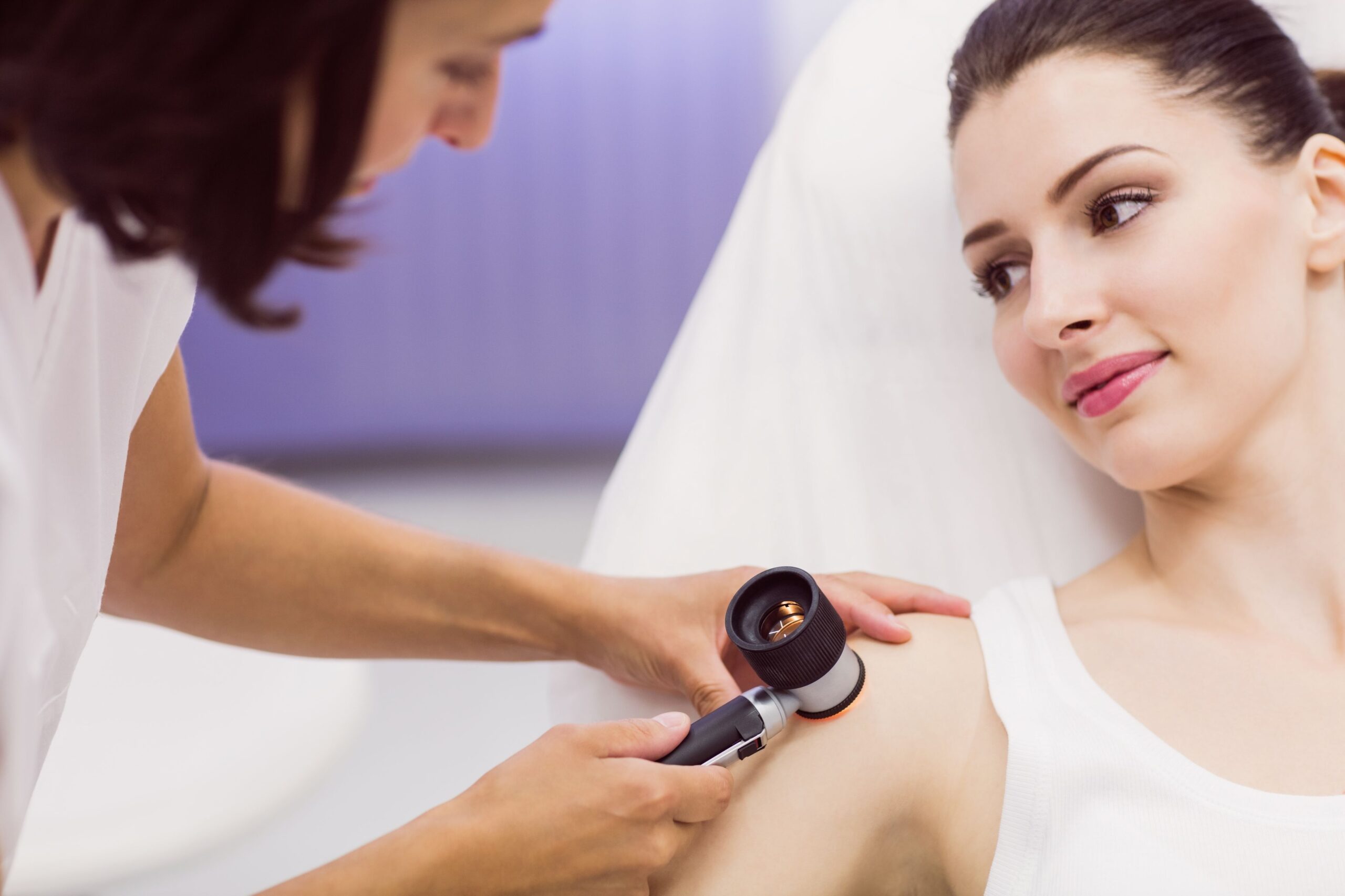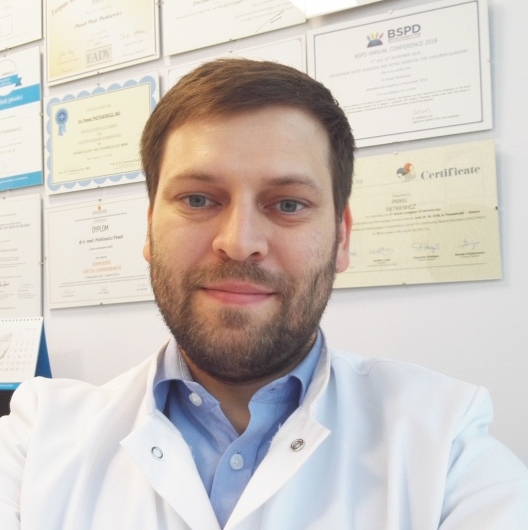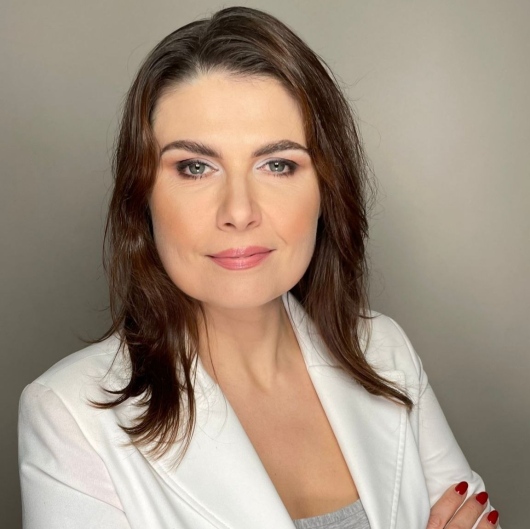Dermatologist
Diseases associated with impaired function of the skin and its appendages (hair, nails).

Dermatology, as a field of medicine, it deals with diseases of the skin, its appendages (hair, nails), diseases of the mucous membranes, as well as systemic diseases giving skin symptoms.

Paweł Pietkiewicz, MD, PhD
Paweł Pietkiewicz, MD, Ph.D is a specialist in dermatology and venereology, one of only a few Poles with a specialization diploma European Union of Medical Professionals (UEMS-EBDV, Frankfurt am Main, 2016) and the only Pole from Professional Diploma of Dermoscopy (Skin Cancer Institute/IDS, 2020).
He gained professional experience as university lecturer for years of work at the Department and Clinic of Dermatology of the Medical University of Karol Marcinkowski in Poznań, w General and Oncological Surgery Clinic Greater Poland Cancer Center, as well as at numerous internships abroad.
Since 2015, he has been conducting screening studies for the early detection of melanoma as part of a pan-European campaign Euromelanoma. He was the scientific director and lecturer of courses for doctors and physicians in the field of dermatoscopy, as well as a lecturer and member of scientific committees of conferences in the country and abroad.
From 2022, he is the President of the Management Board Polish Dermatoscopy Group. From 2021, he represents Poland on the board International Dermoscopy Society. There is also member of the Polish Society of Dermatology (PTD), American Confocal Group, European Academy of Dermatology and Venereology (EADV), European Association for Cancer Procedures (EACR), European Association of Dermato-Oncology (EADO), International Dermoscopy Society (IDS), New York Academy of Sciences (NYAS) and the Skin Cancer Institute.
His achievements include nearly 150 domestic and foreign scientific and popular science publications in the field of dermatology and oncology, including 2 textbooks on dermato-oncology (Cutaneous Melanoma, IntechOpen, London 2020; and Dermatoscopy, IntechOpen, London 2022) and the editor of the Polish edition Dermatoscopy in general dermatology (Edra Urban&Partner, 2023), 9 chapters in Polish and foreign specialist textbooks, and 24 articles collected in the PubMed database.
He is a laureate of:
- UCB Scholarship (2021)
- XNUMXst place in the AI Challenge dermatoscopic competition against the Mole Analyzer Pro system (an advanced artificial intelligence system created to recognize skin cancers, based on deep learning algorithms; Fotofinder) (28th Congress of the European Academy of Dermatology and Venereology, Madrid, Spain, 2019),
- XNUMXst place in the AI Challenge dermatoscopic competition against the Mole Analyzer Pro system (Fotofinder) (24th World Congress of Dermatology, Milan, Italy, 2019),
- Eli Lilly Grant (2019, 2020),
- XNUMXst place in the AI Challenge dermatoscopic competition against the DEXI system (Canfield) (24th World Congress of Dermatology, Milan, Italy, 2019),
- I place in the Dermoscopy Excellence competition (Rome, Italy, 2018)
- British Society for Pediatric Dermatology Grant (BPSD, Glasgow, Scotland, 2018)
- congratulatory letter of the Rector of the Poznan University of Medical Sciences for scientific achievements in 2017.
- Scottish Dermatological Society Grant (SDS, Stirling, Scotland, 2017)
- Euroderm Excellence Grant (EDF, Nice, France, 2015)
- Société Française de Dermatologie Grant (SFD, Paris, France, 2015),
- Michael Hornstein Scholarship (EADV, Valencia, Spain, 2015)
- Doctoral scholarship for employees of the Medical University of Karol Marcinkowski in Poznań (2015)
- congratulatory letter of the Rector of the Poznan University of Medical Sciences for scientific achievements in 2015,
- And prizes in the poster session (XXX Congress of the Polish Society of Dermatology, Krakow, Poland, 2012),
- XNUMXst prizes in the session of Dermatology and Venereology (9th International Congress of Young Medical Scientists, Poznań, Poland, 2009),
Internships abroad:
- EADO Exchange Fellowship (EADO, University Department of Dermatology, Prof. I. Zalaudek, Trieste, Italy, 2018),
- Trialect-Sapienza Fellowship in Non-invasive Dermatologic Imaging and Cancerization Field (Trialect, Department of Dermatology of the Umberto I Polyclinic of the "La Sapienza" University of Rome, Prof. S. Calvieri / Dr. C. Cantisani, Rome, Italy, 2018),
- internships in Scottish dermatology clinics – Queen Elizabeth University Hospital (Glasgow), Royal Hospital for Children (Glasgow), Royal Infirmary of Edinburgh (Edinburgh) and Royal Aberdeen Children's Hospital (Aberdeen, Scotland, 2017),
- internship in the field of skin surgery (Department of Dermatology, University Hospital, Prof. J. Hafner/Prof. S. Läuchli, Zurich, Switzerland, 2015).
The most common diseases encountered in the office:
- atopic dermatitis
- psoriasis
- seborrheic dermatitis
- alopecia
- contact eczema
- juvenile acne and rosacea
- albinism
- pigmented birthmarks
- skin tumors and cancers – basal cell and squamous cell carcinoma, melanoma, soft and hard fibromas
- bacterial, viral and fungal infections of the skin and mucous membranes
- sun and drug-induced skin reactions
- urticaria
- sexually transmitted diseases: syphilis, gonorrhea, chlamydial infections, genital warts, molluscum contagiosum.
Price list
Dermatological consultation
PLN 350Pediatric dermatological consultation
PLN 350Imaging tests (nevi, neoplasms)
PLN 700Whole body dermatoscopy + video dermatoscopy - full assessment of pigmented moles with optional recording of photos of changes requiring monitoring (30-minute visit)
Trichoscopy – assessment in hair diseases (30-minute visit)
Devices used: Dermlite DL3N, DL4, fluorescent dermatoscope DL5, Heine Delta20, Delta30Pro, Handyscope, nUV Casio Dermocamera Dz-100 reflective videodermatoscope.
The FLOSMED clinic does not have a device for mapping birthmarks.Cryosurgery
from PLN 700Cryosurgery (viral warts, seborrheic keratoses, condyloma acuminata, molluscum contagiosum, corns, actinic keratosis - 30-minute visit)Electrosurgery
from PLN 700(seborrheic keratoses, soft fibromas, intradermal nevi, molluscum contagiosum, hemangiomas, actinic keratosis, superficial skin cancers)Skin surgery (after prior consultation and qualification for the procedure)
from 700Removal of soft fibromas
from PLN 700Surgical removal of the skin lesion
(depending on size and location)
with follow-up after suture removalfrom PLN 700-1200Diagnostic tests (during the visit)
Skin biopsy + histology or DIF
PLN 650Bacterial swab
PLN 60aerobic bacteriaBacterial swab
PLN 120aerobic + anaerobic bacteriaBacterial swab
PLN 180aerobic and anaerobic bacteria and fungiTreatment of hypertrophic scars and keloids (during the visit)
PLN 700for 1 scar (usually 4-7 sessions are necessary)Other
Medical certificate for the needs of the employer / school / air travel
PLN 100Renewal of a prescription without the need for a visit
PLN 100Intramuscular administration of the drug
PLN 50

bow. Justyna Kursa-Orłowska
Bow. Justyna Kursa-Orłowska jest Specialist in Dermatology and Venereology, and also a Doctor Aesthetic Medicine.
It warmly welcomes patients of all ages, both adults and children. He treats skin, hair, nail diseases and sexually transmitted diseases. He treats each patient with respect and understanding, approaching each problem individually and thoroughly.
She obtained her medical degree in... 2004 at the Faculty of Medicine of the Medical University of Poznań. In the years 2006-2012 she gained professional experience at Skin Diseases Department at the Provincial Hospital in Poznań, where she completed a specialization internship under the supervision of Professor Zygmunt Adamski. In 2012, she obtained the title of dermatologist and venereologist specialist.
Od 2010, she practiced as a dermatologist in numerous Dermatology Clinics, treating both adults and children. Since 2011, he has been a co-investigator in many clinical trials on biological drugs in the treatment of psoriasis vulgaris, psoriatic arthritis and rheumatological diseases.
In the years 2013-2023, she was associated with the Aspazja Institute, where she gained 10 years of professional experience as an aesthetic medicine doctor. She participated in numerous trainings on advanced techniques of administering botulinum toxin, tissue stimulators, fillers, the use of lasers and radiofrequency. He is a member Polish Society of Dermatology and the Polish Society of Aesthetic Medicine and Anti-Aging. Is author and co-author of scientific works in the field of dermatology and venereology and co-author of books.
The most common diseases encountered in the office:
- atopic dermatitis
- psoriasis
- seborrheic dermatitis
- alopecia
- contact eczema
- juvenile acne and rosacea
- albinism
- pigmented birthmarks
- skin tumors and cancers – basal cell and squamous cell carcinoma, melanoma, soft and hard fibromas
- bacterial, viral and fungal infections of the skin and mucous membranes
- sun and drug-induced skin reactions
- urticaria
- sexually transmitted diseases: syphilis, gonorrhea, chlamydial infections, genital warts, molluscum contagiosum.
Price list
Dermatological consultation
PLN 250Pediatric dermatological consultation
PLN 250Consultation + videodermatoscopy
PLN 250Dermatological consultation + videodermatoscopyCryosurgery
PLN 400Cryosurgery (viral warts, seborrheic warts, genital warts, molluscum contagiosum, corns, actinic keratosis)
The price includes consultation, over 5 changes the price is PLN 500
Contact
Address
- st. Barwicka 14A, 60-192 Poznań
Contact number
Email for booking
Work hours
- Mon. - Fri: 10 - 20, Sat: 10 - 14
Skin diseases, including atopic dermatitis (AD), pose a significant challenge in the field of dermatology for both adults and children. AD, which is a chronic inflammatory skin disease, is characterized by intense itching, redness and peeling of the skin, significantly affecting the quality of life of patients^[1^]. In recent years, research has focused not only on the physiological aspects of these diseases, but also on their psychological and social impact.
Chronic itching, one of the main symptoms of atopic dermatitis, was examined in detail in a study conducted in São Paulo, where over 90% of patients with atopic dermatitis experienced this symptom at least once a day^[2^]. This itching not only worsens the skin condition, but also affects mental health, performance at work and school, and patients' social interactions.
It is equally important to understand that the treatment of atopic dermatitis is not limited to drug therapy. Studies have shown that methods such as mindfulness and self-compassion training can significantly improve the quality of life of adult patients with AD, highlighting the need for a holistic approach to treatment^[3^].
In the pediatric context, atopic dermatitis is one of the most common skin disorders in children, and its management requires special attention due to its impact on child development and the family. Education of patients and their families plays a key role in effective disease management^[4^].
Recent research also highlights the role of melatonin, not only as a regulator of the sleep cycle, but also as a potential therapeutic agent in the treatment of skin diseases, including atopic dermatitis. Its antioxidant and immunomodulatory properties open new perspectives in dermatological treatment^[5^].
This article aims to provide an overview of contemporary research and treatments for skin disorders in adults and children, with an emphasis on atopic dermatitis, emphasizing the importance of an interdisciplinary approach in the treatment of these complex conditions.
Footnotes:
- Martha Estefania Pinedo Hurtado et al., "Atopic Dermatitis and its Management by the First Contact Doctor," International Journal of Medical Science and Current Procedures, 2023.
- GB Soares et al., “Evaluating chronic pruritus prevalence, characteristics and effects on atopic dermatitis patients from a referral university hospital in São Paulo, Brazil,” British Journal of Dermatology, 2023.
- Sanae Kishimoto et al., “Efficacy of Integrated Online Mindfulness and Self-compassion Training for Adults With Atopic Dermatitis,” JAMA Dermatology, 2023.
- Ibid.
- I. Bešlić et al., "Melatonin in Dermatologic Allergic Diseases and Other Skin Conditions," International Journal of Molecular Sciences, 2023.
Chronic itching is one of the most troublesome symptoms of atopic dermatitis (AD), having a significant impact on the quality of life of patients. A study conducted in São Paulo showed that over 90% of AD patients experience itching at least once a day, which significantly affects their daily functioning^[1^]. This itching not only causes physical discomfort, but also leads to sleep disorders, stress and emotional problems.
The impact of itch on mental health is significant. Patients with atopic dermatitis often experience anxiety and depression, which can lead to social isolation and low self-esteem. Additionally, chronic itching can negatively impact performance at work and school, further impairing patients' quality of life^[2^].
In the context of treatment, it is important that the approach is multidimensional. In addition to standard treatments such as the use of moisturizing creams and anti-inflammatory drugs, psychological support is also important. Educating patients about itch management and relaxation techniques can significantly improve their well-being and quality of life.
The conclusions from the study conducted in São Paulo highlight the need for further research into chronic pruritus and its impact on the lives of patients with atopic dermatitis. Understanding this phenomenon is key to developing more effective treatment strategies and support for patients struggling with this bothersome symptom.
Footnotes:
- GB Soares et al., “Evaluating chronic pruritus prevalence, characteristics and effects on atopic dermatitis patients from a referral university hospital in São Paulo, Brazil,” British Journal of Dermatology, 2023.
- Ibid.
In recent years, more and more attention has been paid to the psychological aspects of the treatment of atopic dermatitis (AD). A study conducted in Japan showed that mindfulness and self-compassion training can significantly improve the quality of life of adult patients with AD^[1^]. Study participants who completed eight 90-minute online training sessions showed significant improvements in their Dermatology Life Quality Index (DLQI) scores, demonstrating a reduced impact of atopic dermatitis on their daily lives.
Mindfulness and self-compassion training focuses on developing present-moment awareness and acceptance of your experience, which can help you cope with the stress and emotional aspects of skin disease. Study participants reported lower levels of stress, better sleep quality, and reduced itching and scratching intensity.
Furthermore, this study highlights the importance of a holistic approach to the treatment of AD that includes both physical and psychological aspects. Integrating psychological methods such as mindfulness and self-compassion into standard dermatological treatment protocols can provide significant benefits for patients.
The conclusions of this study open up new possibilities in the treatment of atopic dermatitis, emphasizing that managing this disease requires not only medical interventions, but also psychological and emotional support.
Footnotes:
- Sanae Kishimoto et al., “Efficacy of Integrated Online Mindfulness and Self-compassion Training for Adults With Atopic Dermatitis,” JAMA Dermatology, 2023.
Atopic dermatitis (AD) in children is a special challenge for both doctors and parents. It is one of the most common skin diseases in children, characterized by a chronic course and a significant impact on the quality of life of both children and their families^[1^]. The diagnosis of atopic dermatitis is based on clinical assessment and differentiation from other dermatological diseases. Treatment is tailored to the severity of the disease and the patient's age, with primary use of local treatment.
Education of patients and their families plays a key role in the effective management of AD. Parents and caregivers should be informed about the nature of the disease, treatments, and strategies to manage symptoms such as itching and dry skin. It is especially important to understand that atopic dermatitis is not only a skin problem, but also a condition that can affect the emotional and social aspects of a child's life.
Various methods are used to treat atopic dermatitis in children, from topical corticosteroids and calcineurin inhibitors to modern biological therapies in more severe cases. It is important that the treatment is comprehensive and takes into account both the physical and emotional aspects of the disease.
A multidisciplinary approach, including dermatologists, pediatricians, psychologists and dietitians, may be crucial in the effective management of atopic dermatitis in children. Cooperation between specialists and parents is essential to provide the best care and support for young patients.
Footnotes:
- Martha Estefania Pinedo Hurtado et al., "Atopic Dermatitis and its Management by the First Contact Doctor," International Journal of Medical Science and Current Procedures, 2023.
Melatonin, known primarily as a hormone that regulates the sleep cycle, is gaining increasing interest as a potential therapeutic agent for the treatment of various skin conditions, including atopic dermatitis (AD). Its antioxidant, immunomodulatory and anti-inflammatory properties open new perspectives in dermatology^[1^].
Studies have shown that melatonin may play a role in alleviating the symptoms of atopic dermatitis, especially in the context of sleep disturbances and intense itching that often accompany this disease. Melatonin, by acting directly on free radicals and the internal antioxidant enzyme system, can help protect the skin from damage and accelerate its regeneration^[2^].
Moreover, melatonin has a hypopigmentation effect in hyperpigmentation disorders and helps maintain the integrity of the epidermal barrier. Its role in body thermoregulation and potential use in the treatment of scalp diseases, such as androgenic alopecia or telogen effluvium, are other areas of interest for researchers.
In the context of treating atopic dermatitis, melatonin may be particularly useful in cases where the disease is combined with intense itching and sleep disturbances. Its ability to improve sleep quality and relieve itching can significantly impact patients' overall skin health and well-being.
Conclusions from research on melatonin in dermatology indicate its potential use as a complement to standard treatment methods, offering new possibilities in the treatment of atopic dermatitis and other skin diseases.
Footnotes:
- I. Bešlić et al., "Melatonin in Dermatologic Allergic Diseases and Other Skin Conditions," International Journal of Molecular Sciences, 2023.
- Ibid.
This article presents an overview of contemporary research and methods of treating skin diseases, with particular emphasis on atopic dermatitis (AD) in adults and children. The analyzed studies highlight the complexity and multidimensionality of this disease, requiring a holistic approach to treatment and management.
Chronic pruritus, one of the main symptoms of atopic dermatitis, significantly affects the quality of life of patients, highlighting the need for more effective treatment strategies and psychological support. Studies have shown that mindfulness and self-compassion training can significantly improve the quality of life of adult patients with atopic dermatitis, demonstrating the value of integrating psychological methods into standard dermatological treatment protocols.
In the pediatric context, atopic dermatitis is one of the most common skin disorders in children, and its effective management requires collaboration between physicians, parents and caregivers. Education and support are key in helping families cope with this disease.
Melatonin, as a potential therapeutic agent in the treatment of atopic dermatitis and other skin diseases, opens new perspectives in dermatology. Its antioxidant, immunomodulatory and anti-inflammatory properties may offer additional benefits in the treatment of these complex conditions.
Taken together, these studies highlight the importance of an interdisciplinary approach in the treatment and management of skin conditions. Understanding and addressing both the physical and psychological aspects of these diseases is crucial to improving patients' quality of life.
